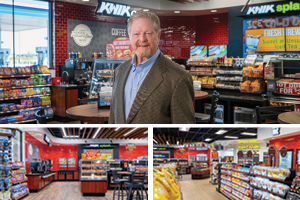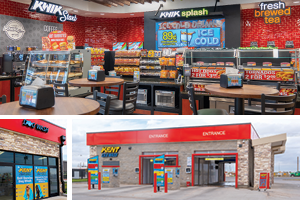Kent Kwik stores are a common sight across West Texas. In addition to its flagship convenience store banner, the Kent Companies includes standalone restaurants, tire stores, a check cashing business, a fuel transportation fleet, a sign company, wholesale fuel accounts and even urgent care facilities.
Bill Kent has owned the Kent Companies since 1984 and was on the NACS board of directors from 2015 to 2021. Under Kent’s leadership, the Kent Companies has grown to include more than 100 convenience store locations and operations in eight states.
Let’s jump right in. What about Kent Kwik are you most proud of?
That’s pretty simple for me. I’m proudest of our people. This is our 67th year, and we’ve had a lot of people over the years, as my father did before me, who have been such an integral part of our success. I’m blessed to have good people and I realize that without good people, all we’re really doing is operating a bunch of brick buildings with merchandise. It’s all about the people, and that is, without a doubt, the thing I’m proudest of.
“West Texas has great, resilient people. Tough people.”
What’s unique about the West Texas market? How have those West Texas roots shaped the DNA of your company?
I think every place is unique, but certainly West Texas is. In West Texas, the only resource we really have is oil and gas, and it’s a very entrepreneurial area. It’s a place where people are fairly forgiving, supportive and willing to see people succeed. I’ve had luck attracting some people to Midland, just because it does have a good reputation for an entrepreneurial spirit. And a lot of people have found success here financially.
Now, the other side of it is, in the Permian Basin area where our headquarters is, we’re subject to all the booms and busts of the oilfield and the oil price cycle. When it’s good, when it’s booming, it’s really good. When it’s a bust, it’s ugly. And those are difficult times.
 Bill Kent purchased the Kent Companies from his family in 1984. Under his leadership, it’s grown from having less than 15 convenience store locations to more than 100.
Bill Kent purchased the Kent Companies from his family in 1984. Under his leadership, it’s grown from having less than 15 convenience store locations to more than 100.
It’s taught us a lot over the years. It’s difficult to do a lot of forward planning when you’re not in an economy that has either steady growth or stays flat. We just seem to either be on a massively upward swing or a massively downward swing, and that makes planning very difficult.
Another one of the downsides is we have some very distorted, unique pay scales and pay rates in West Texas, in my opinion, because of the oilfields. It’s one of the few places that I know of where a kid right out of high school can make six figures. It may be really difficult, hard work— potentially even dangerous work—but there aren’t a lot of places like that. The downside, from our perspective, is that it makes it difficult to find entry level people. It also distorts all types of pay rates, including even office positions.
And then when the bust comes and they start laying oilfield workers off, people believe that their value to a company is what they were making during the boom. So that’s one of the downsides to it.
West Texas has great, resilient people. Tough people. They’re just the salt of the earth. I love them, and they’re great customers. You know, there are great people all over the world and certainly all over the country. But I think West Texans are unique, and we’re really blessed to be out here.
The Kent Companies has quite a diverse portfolio. Can you explain how that came to be?
My oldest brother, Jim, along with my dad, decided we couldn’t keep operating old service stations just selling gasoline. They started the process [of expanding the business in other ways] years ago. My middle brother, Tom, got us into the quick lube business. For the longest time, those were the two businesses, convenience stores and quick lubes, that were growing simultaneously. I’m the youngest, and I bought the business from my family in 1984.
I’d love to tell you that each one of the businesses we’re in has been really strategic … but it really hasn’t. We’ve planned and executed some of them well, but a lot of them we’ve kind of just fallen into. We put some check cashing Mr. Payrolls in our stores, and then ended up acquiring that franchisee when it was struggling. And then with that business, we started acquiring all our ATMs, and now we have ATMs all over the place.

After that, I was building a truck stop in my hometown of Monahans, Texas, and the mayor is a guy that I grew up with and played football with, and he called me and said, “Bill, we need a restaurant in this town.” I ended up looking and found the Huddle House system, and that’s how we ended up in the restaurant business. From there, we’ve expanded and started our own restaurant operation called Rustic Cafe.
The foodservice business in the convenience store industry is such a significant piece today, and so we’ve pursued that. We have our own commissary, and we have our own Kwik Eats operation inside the store. We make hamburgers, chicken strips, breakfast burritos, pizza and other comfort food, all of that just kind of evolved.
We backed into a sign company, just because we couldn’t get service on our signs and I got frustrated. And then I got frustrated with common carriers not being able to keep drivers and our stores wet, so we got into the transportation business. My father was in the tire business, and we’re still in that. We just keep finding things we either have to get into or we feel like we’re forced into.
The one we really gave a lot of thought to get into strategically was the urgent care business. I had a doctor friend of mine that had a few and he was having some health issues. I had been thinking about this business for quite a while, and I thought that was an industry that was unique and had some interest to me.
“We really focus on our team members that interact with the guests.”
You recently acquired eight Jack’s Convenience Stores. What’s the secret to a successful acquisition?
Well, we’re slowly getting better at that with each acquisition we make. Adam Sturdivant, Vice President of Strategic Planning, leads our acquisition process. For us, it’s getting an opportunity to send our advanced team into the business when it’s appropriate timing for us to evaluate what needs to happen at the store level, from signage and POS equipment to software integration and security systems. And then we have a separate group that looks at what needs to be done to try to turn the store into a Kent Kwik, not counting the fact that our HR team, led by Meredith Bright, spend a lot of time going back and forth to onboard those folks.
Our COO/President, Todd Watkins, has a really excellent military background. One of the things he’s excellent at is debriefing our folks after each acquisition to find out what we could have done better, what could have been smoother, where we messed up and where we did well. We debrief each one, and we try to be objective and ask, what can we do to be better?
How would you describe Kent Kwik’s competitive advantage?
When I bought the business, we weren’t very big. We had quite a few service stations, but we only had a few quick lubes and less than 15 convenience stores at the time. I had to borrow all the money to buy my family out, and the only way I saw the business could survive was through great people. We just had to have better people and better guest service. And we had to do the basics better. We had to run clean stores, have clean restrooms, and have really good, friendly, well-trained team members. We built our whole organization around that.
So if we have a competitive advantage, I’ll tell you, that’s what it is. We really focus on our team members that interact with the guests. We spend a lot of time training them. We really have a very extensive screening process, and we centrally hire all our people. … We do hear and get a lot of feedback from mystery shoppers, as well as our own anecdotal information and from guests sharing, that they can really tell a difference with our team members relative to our competition. It’s continued to be part of our culture, and we’re proud of that culture. We’re proud of our people.